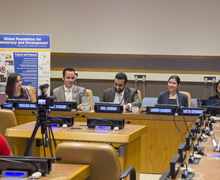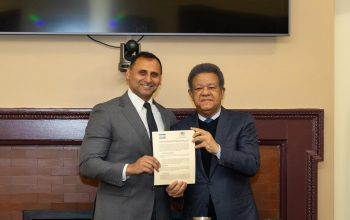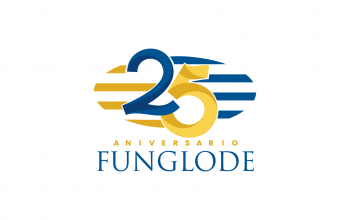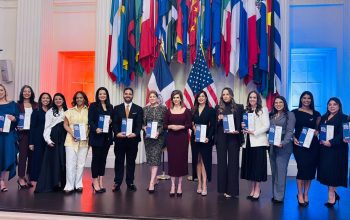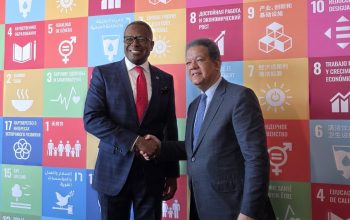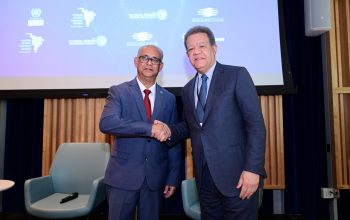news
“If We Empower Citizens We Can Help the World Become Better”, States Director of the Center for UN Studies at Seton Hall University
July 21, 2015
Seeking to provide a space for showcasing the role of civil society in promoting and implementing the Post-2015 Development Agenda, GFDD/Funglode put together a side event during the final Intergovernmental Negotiations on the UN’s Post-2015 Development Agenda, on Tuesday July 21st at United Nations headquarters. With the participation of academic experts and NGO representatives, GFDD/Funglode moderated an engaging panel discussion highlighting the role that local
communities and youth groups can play in promoting sustainable development and the UN’s new development framework.
The event, which was co-sponsored by the Sustainable Development Solutions Network and the School of Diplomacy and International Relations at Seton Hall University, opened before a packed auditorium comprised of civil society representatives, policymakers, UN delegates, and other invited guests.
The panelists included: Dr. Martin Edwards, Director of the Center for United Nations and Global Governance Studies, Seton Hall University; Lauren Barredo, Manager of the Thematic Groups on Health, Agriculture, and Extractive Industries, Sustainable Development Solutions
Network, Emil Chireno, Executive Director, United Nations Association of the Dominican Republic (UNA-DR), Marc Jourdan, UN Representative & Environmental Programs Coordinator, Global Foundation for Democracy and Development (GFDD); and Virginia Wall, UN Representative & Senior Researcher, Fundación Global Democracia y Desarrollo (Funglode).
Emil Chireno moderated the discussion. He welcomed the
attendees before stressing the importance of the Post-2015 Development Agenda for civil society both in the Dominican Republic and abroad. He then gave the floor to Dr. Martin Edwards who explained how Seton Hall University has supported the negotiations and implementation of the Post-2015 Development Agenda. Edwards stressed the importance of promoting an ambitious agenda in the classrooms by “communicating complexity, mobilizing collective action, and training skills.”
He noted that if “we can explain the Sustainable Development Goals to elementary school kids, we can surely explain it to adults.” He concluded by stressing that "If we empower citizens, we can help the world become better."
Next, Lauren Barredo gave her remarks on the work that the Sustainable Development Solutions Network (SDSN) is doing to promote the Post-2015 Development Agenda. She explained that SDSN is a membership based
organization that is open to “knowledge creating institutions”. She highlighted that SDSN facilicates information exchange through its mix of publications and innovative online courses on sustainable development, from knowledge creators to the UN and vice versa. Barredo mentioned that “we have found that young people are really good communicators for sustainable development” and identified this as the reason why civil society should “engage
them in the creation of innovative and sustainable solutions to global development challenges.”
Following Barredo’s detailed presentation, Chireno gave a brief presentation of the work of UNA-DR and its programs in the Dominican Republic, including its UN Youth Delegates program and Model UN conferences. He explained that it was “because of Model UN conferences that so many young people interested in international affairs”.
Marc Jourdan gave an overview of GFDD and Funglode’s environment programs and how they look to implement the thematic areas raised in the new development agenda, such as public participation
of local communities for sustainable development, environmental education and poverty eradication. He noted that the programs offered tools promoting understanding and action on sustainability, particularly for those regions most vulnerable to its impacts in the Dominican Republic. He explained that programs like ReCrearte and DREFF look to “engage local communities with policy makers and the private sector (in sustainable development discussions), because the youth group is very
important to us.” The UN representative also mentioned how, the Foundation’s interventions, seek “to remind delegates to bring civil society into the discussion to achieve a truly sustainable agenda over the next 15 years.”
Finally, Virginia Wall gave the audience an overview of the efforts of Funglode’s programs in the Dominican Republic and how they address the new UN development framework at both the national and
regional levels. She told attendees that “we are all worried about the same problems, we just don’t know what is happening at the international level, and that is where civil society comes in.” She listed the foundation’s collaboration events with UN Agencies such as UNESCO to showcase its engagement in education for sustainable development. She concluded by informing the audience that the Dominican path to sustainable development was going to focus
“on climate change, education, and the ICT’s means of implementation”. She explained that NGOs like GFDD/Funglode act as a forum “providing an opportunity for a little country such as the Dominican Republic to make its voice heard about what it is doing for sustainable development.”
Following the interventions, Chireno opened the room up for questions from the audience. The participants engaged in an interactive discussion
on simplifying the Sustainable Development Goals (SDgs) for youth groups, providing access to information for civil society and the role of academia in this agenda.
Related Links:
http://unsdsn.org/
http://www.unadr.org.do/
https://www.shu.edu/academics/diplomacy/center-for-global-governance-studies/
http://www.funglode.org/
http://www.r3crearte.org/
http://www.eco-huertos.org
http://www.dreff.org/

